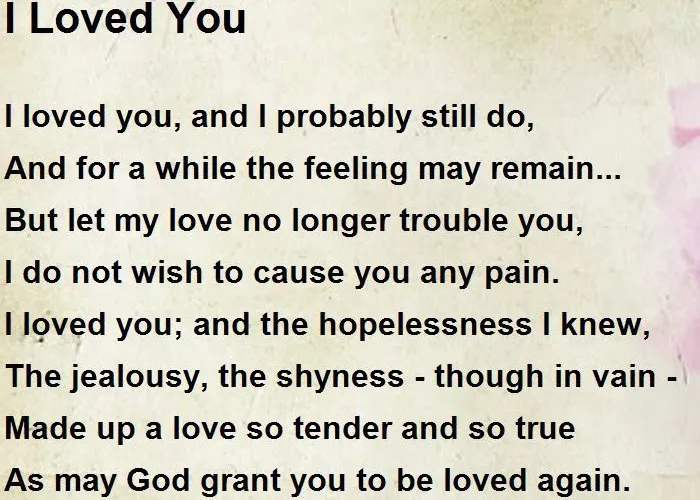Welcome to Poem of the Day – I Loved You by Alexander Sergeyevich Pushkin.
Alexander Sergeyevich Pushkin, often hailed as the father of Russian literature, created poetry that resonates with universal themes of love, loss, and longing. One of his most renowned works, “I Loved You”, stands as a testament to the depth and elegance of his poetic craftsmanship. This short yet powerful lyric poem explores the bittersweet nature of unrequited love, marking a poignant moment in Pushkin’s exploration of emotional vulnerability. Through careful examination of the poem’s themes, structure, and language, we can better appreciate Pushkin’s mastery in conveying complex emotional experiences with simplicity and grace.
I Loved You Poem Explanation
The central theme of “I Loved You” is unrequited love—specifically, the speaker’s lingering feelings for someone whom they once loved but who may not have reciprocated those feelings. Pushkin presents love not as a grand, passionate affair, but as a quieter, more melancholic experience that brings both pain and acceptance. The poem speaks to the idea that love, even when not returned, leaves an indelible mark on the lover’s heart. The speaker, having loved the object of his affection with devotion, acknowledges that the feelings are no longer active, but a sense of nostalgia and residual attachment persists.
The emotional maturity of the speaker is evident in their decision to release the other person from any sense of obligation. The poem opens with the declaration, “I loved you: and perhaps I love you still,” immediately setting the tone of quiet reflection. This subtle expression of ongoing emotion—though tinged with past sadness—reveals the speaker’s capacity for grace and understanding in love. The speaker neither demands reciprocation nor seeks revenge for their unreturned affection, but instead seems to accept the situation with quiet resignation.
Structure and Form
The poem is written in iambic tetrameter, a rhythm that lends itself to a flowing, almost conversational tone. This meter enhances the sense of emotional restraint, reflecting the speaker’s attempt to hold their feelings in check. The relatively short length of the poem—comprising just four stanzas—speaks to the concise and understated nature of the speaker’s sentiments. Pushkin’s choice of brevity allows the poem to capture the essence of the experience without over-elaboration, maintaining the emotional depth and nuance that makes the work so compelling.
The poem follows a simple rhyme scheme of ABAB, with each quatrain concluding with a satisfying resolution that reinforces the speaker’s acceptance of their feelings. This structure mirrors the gradual process of emotional catharsis, as the speaker moves from the intensity of love to a calmer state of understanding. The rhyme, though simple, also contributes to the smooth, melodic quality of the poem, further emphasizing the harmony between the speaker’s inner thoughts and the elegance of their expression.
Language and Imagery
Pushkin’s use of language in “I Loved You” is marked by a refined simplicity. The diction is straightforward, yet the emotions conveyed are complex. There is no grandiosity in the speaker’s language; instead, the speaker’s restraint speaks volumes about their character. The tone of the poem is contemplative, with each line carefully crafted to evoke a sense of introspection.
The most powerful image in the poem is that of love as a quiet, enduring force. Pushkin does not describe grand gestures or tumultuous emotions; rather, he evokes love through the restraint and quiet dignity of the speaker. In the final lines of the poem, the speaker declares, “I loved you without hope or reason,” capturing the essence of a love that exists not out of expectation but as a natural, inevitable force. The use of the word “hope” suggests that the speaker never sought to alter the course of the other person’s affections, accepting that love is not always reciprocal.
Moreover, Pushkin imbues the poem with a sense of timelessness, suggesting that love itself is a universal experience that transcends the specific circumstances of the speaker’s life. In this way, the poem speaks to the broader human condition: that love, in all its forms, remains an enduring and indelible part of the human experience.
Conclusion
In “I Loved You”, Alexander Pushkin explores the complexities of love with rare emotional depth and clarity. Through a simple structure, restrained language, and poignant imagery, Pushkin captures the essence of love in its quietest, most dignified form. The speaker’s acknowledgment of their past affection, combined with the graceful acceptance of the other person’s indifference, highlights a maturity and wisdom that transcend youthful passion. Pushkin’s ability to distill such a profound emotional experience into a few short lines is a testament to his genius, making “I Loved You” not only one of his most enduring works but also one of the most universally relatable poems in the canon of world literature.

